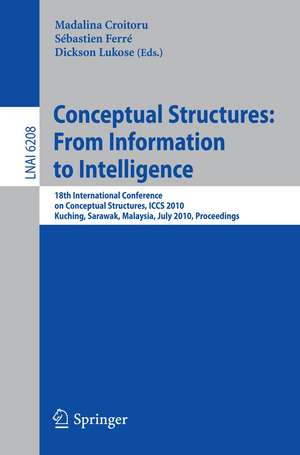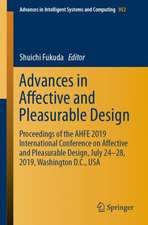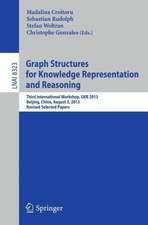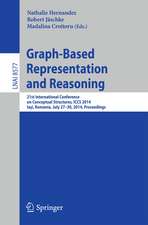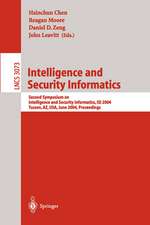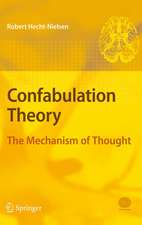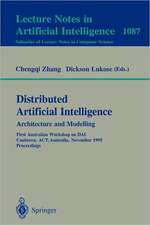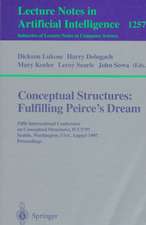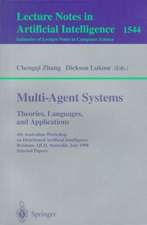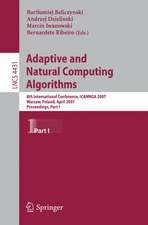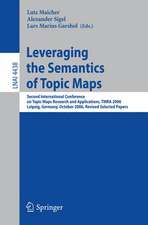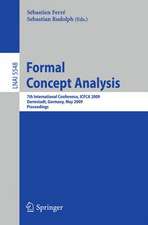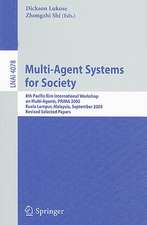Conceptual Structures: From Information to Intelligence: 18th International Conference on Conceptual Structures, ICCS 2010, Kuching, Sarawak, Malaysia, July 26-30, 2010, Proceedings: Lecture Notes in Computer Science, cartea 6208
Editat de Madalina Croitoru, Sébastien Ferré, Dickson Lukoseen Limba Engleză Paperback – 7 iul 2010
Din seria Lecture Notes in Computer Science
- 20%
 Preț: 1061.55 lei
Preț: 1061.55 lei - 20%
 Preț: 307.71 lei
Preț: 307.71 lei - 20%
 Preț: 438.69 lei
Preț: 438.69 lei - 20%
 Preț: 579.30 lei
Preț: 579.30 lei -
 Preț: 410.88 lei
Preț: 410.88 lei - 17%
 Preț: 427.22 lei
Preț: 427.22 lei - 20%
 Preț: 596.46 lei
Preț: 596.46 lei - 15%
 Preț: 448.04 lei
Preț: 448.04 lei - 20%
 Preț: 353.50 lei
Preț: 353.50 lei -
 Preț: 389.49 lei
Preț: 389.49 lei - 20%
 Preț: 309.90 lei
Preț: 309.90 lei - 20%
 Preț: 645.28 lei
Preț: 645.28 lei - 20%
 Preț: 763.23 lei
Preț: 763.23 lei - 15%
 Preț: 580.46 lei
Preț: 580.46 lei - 20%
 Preț: 310.28 lei
Preț: 310.28 lei - 20%
 Preț: 655.02 lei
Preț: 655.02 lei - 20%
 Preț: 1183.14 lei
Preț: 1183.14 lei - 20%
 Preț: 340.32 lei
Preț: 340.32 lei -
 Preț: 449.57 lei
Preț: 449.57 lei - 20%
 Preț: 591.51 lei
Preț: 591.51 lei - 18%
 Preț: 938.83 lei
Preț: 938.83 lei - 20%
 Preț: 337.00 lei
Preț: 337.00 lei - 20%
 Preț: 649.50 lei
Preț: 649.50 lei - 20%
 Preț: 607.40 lei
Preț: 607.40 lei - 20%
 Preț: 1414.79 lei
Preț: 1414.79 lei - 20%
 Preț: 1024.44 lei
Preț: 1024.44 lei - 20%
 Preț: 583.40 lei
Preț: 583.40 lei - 20%
 Preț: 453.32 lei
Preț: 453.32 lei - 20%
 Preț: 575.49 lei
Preț: 575.49 lei - 20%
 Preț: 1075.26 lei
Preț: 1075.26 lei - 20%
 Preț: 585.88 lei
Preț: 585.88 lei - 20%
 Preț: 825.93 lei
Preț: 825.93 lei - 17%
 Preț: 360.20 lei
Preț: 360.20 lei - 20%
 Preț: 763.23 lei
Preț: 763.23 lei - 20%
 Preț: 340.32 lei
Preț: 340.32 lei - 20%
 Preț: 504.58 lei
Preț: 504.58 lei - 20%
 Preț: 369.13 lei
Preț: 369.13 lei - 20%
 Preț: 580.93 lei
Preț: 580.93 lei - 20%
 Preț: 343.62 lei
Preț: 343.62 lei - 20%
 Preț: 350.21 lei
Preț: 350.21 lei - 20%
 Preț: 583.40 lei
Preț: 583.40 lei - 20%
 Preț: 583.40 lei
Preț: 583.40 lei - 15%
 Preț: 438.59 lei
Preț: 438.59 lei - 20%
 Preț: 341.95 lei
Preț: 341.95 lei - 20%
 Preț: 238.01 lei
Preț: 238.01 lei - 20%
 Preț: 538.30 lei
Preț: 538.30 lei
Preț: 329.58 lei
Preț vechi: 411.98 lei
-20% Nou
Puncte Express: 494
Preț estimativ în valută:
63.07€ • 65.61$ • 52.07£
63.07€ • 65.61$ • 52.07£
Carte disponibilă
Livrare economică 22 martie-05 aprilie
Preluare comenzi: 021 569.72.76
Specificații
ISBN-13: 9783642141966
ISBN-10: 364214196X
Pagini: 219
Ilustrații: XII, 207 p. 51 illus.
Greutate: 0.34 kg
Ediția:2010
Editura: Springer Berlin, Heidelberg
Colecția Springer
Seriile Lecture Notes in Computer Science, Lecture Notes in Artificial Intelligence
Locul publicării:Berlin, Heidelberg, Germany
ISBN-10: 364214196X
Pagini: 219
Ilustrații: XII, 207 p. 51 illus.
Greutate: 0.34 kg
Ediția:2010
Editura: Springer Berlin, Heidelberg
Colecția Springer
Seriile Lecture Notes in Computer Science, Lecture Notes in Artificial Intelligence
Locul publicării:Berlin, Heidelberg, Germany
Public țintă
Professional/practitionerCuprins
Invited Papers.- Entities and Surrogates in Knowledge Representation.- Exploring Conceptual Possibilities.- Graphical Representation of Ordinal Preferences: Languages and Applications.- Combining Description Logics, Description Graphs, and Rules.- Practical Graph Mining.- Accepted Papers.- Use of Domain Knowledge in the Automatic Extraction of Structured Representations from Patient-Related Texts.- Translations between RDF(S) and Conceptual Graphs.- Default Conceptual Graph Rules, Atomic Negation and Tic-Tac-Toe.- On the Stimulation of Patterns.- Ontology-Based Understanding of Natural Language Queries Using Nested Conceptual Graphs.- An Easy Way of Expressing Conceptual Graph Queries from Keywords and Query Patterns.- Natural Intelligence – Commonsense Question Answering with Conceptual Graphs.- Learning to Map the Virtual Evolution of Knowledge.- Branching Time as a Conceptual Structure.- Formal Concept Analysis in Knowledge Discovery: A Survey.- Granular Reduction of Property-Oriented Concept Lattices.- Temporal Relational Semantic Systems.- Accepted Posters.- FcaBedrock, a Formal Context Creator.- From Generalization of Syntactic Parse Trees to Conceptual Graphs.- Conceptual Structures for Reasoning Enterprise Agents.- Conceptual Graphs for Semantic Email Addressing.- Introducing Rigor in Concept Maps.- Conceptual Knowledge Acquisition Using Automatically Generated Large-Scale Semantic Networks.
